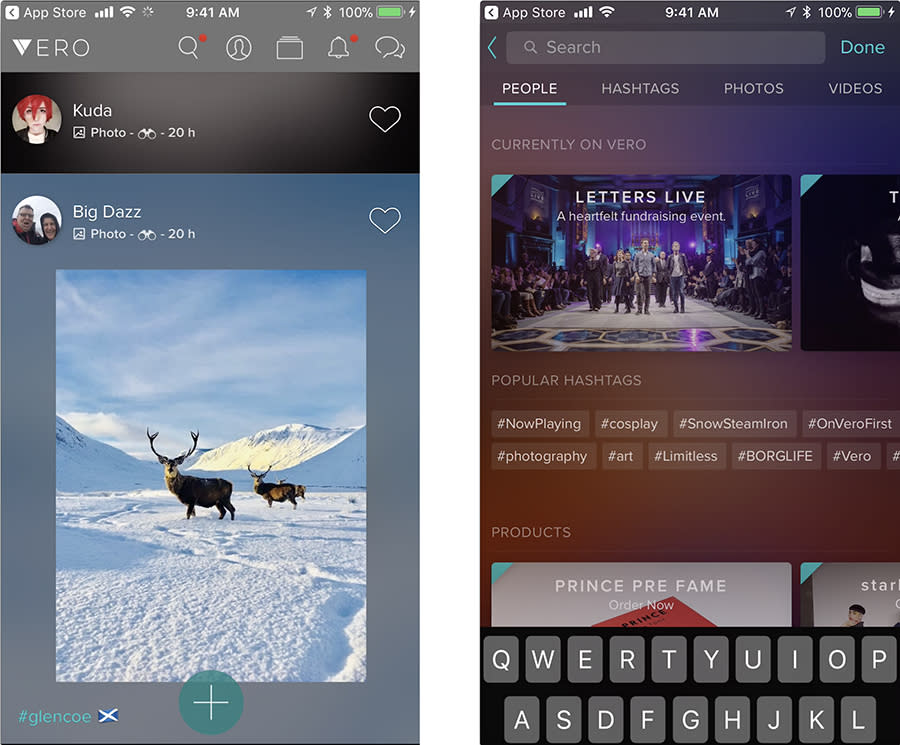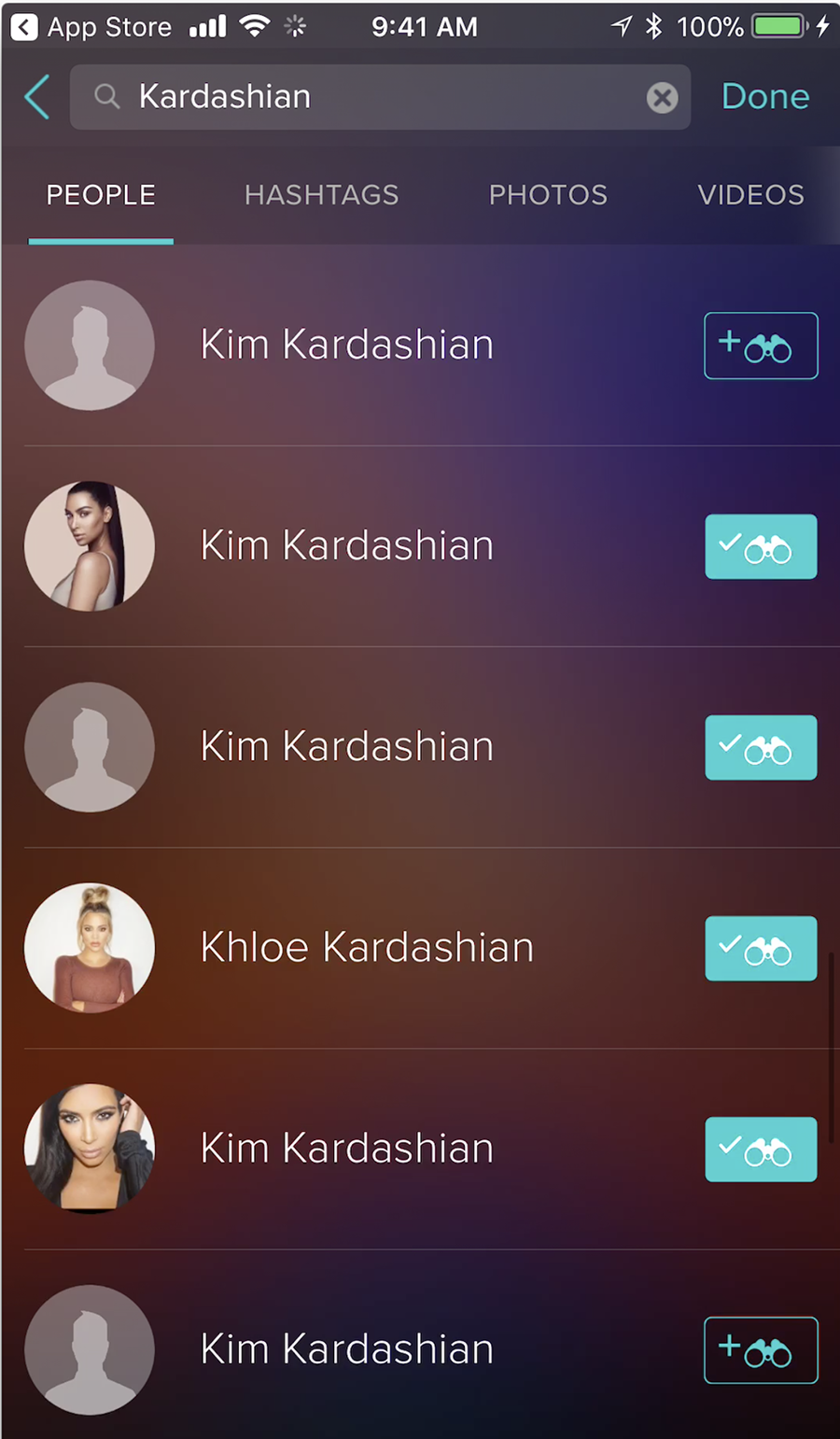The controversial Vero is this week's David Pogue's Rated:App
Welcome to David Pogue’s Rated:App series. Each week, I’ll install whatever is the No. 1 bestselling app on the iOS or Android store and review it, to save you the effort in case it’s a turkey. If you’re viewing this on your phone, in an app or Facebook or Twitter, the video plays vertically — it fits your screen exactly, so you can see what it’d look like if you were running the app yourself!
When I started this series, I was sort of worried. What if the No. 1 app every week was the same? What if it’s the Facebook or Instagram app, week after week?
So far, that hasn’t happened. In fact, the app that popped up at the top spot this week — briefly — is a total shock. It’s been around since 2015, it’s got only a 2.2 rating out of 5 on the app stores, and it wasn’t even in the top 100 last week. What’s going on!?
The app is Vero (rhymes with “arrow”). It’s a social network, modeled on Instagram. And its sudden arrival in the top spot has to do with an announcement the company made: That the first million people who signed up would get to use Vero free forever. After that, the company said that it would charge money to use the service. (It hasn’t said how much.)

In other words, the app’s sudden surge is based on FOMO, the fear of missing out. People rushed to grab Vero, just in case it someday becomes a thing.
It won’t.
Instagram Plus
Vero is basically Instagram — a scrolling infini-list of photos posted by your friends, with the option to leave comments or “like” them — with a few enhancements:
It has a dark design — black background.
The “newsfeed” posts appear chronologically. On Instagram, by contrast, mysterious algorithms determine which posts you see, and in which order — a setup that a lot of people despise.
There’s no advertising. That’s why the company plans to charge people to use Vero.
The company says that it won’t collect any data on how you use the service.
What you can post is more flexible than what Instagram permits. Photos can be any shape, and you can also post links to books, movies, TV shows, or places.
Each time you post, you can specify which of your social circles gets to see it: Friends, Close Friends, Acquaintances, or Followers. (Yes, this means that every time you add a friend, you must specify which category that person falls in.) Shades of Google+.

Some of those are noble and welcome changes. But before you dive in…
What’s wrong with Vero
Vero enjoyed a 48-hour moment of No. 1 glory earlier this week, but then came a backlash the size of Jupiter.
The biggest gripe is that Vero is slow and glitchy — and it was. The service was overwhelmed by all of those fear-of-missing-out new members, so network errors and “server could not be reached” messages were constant. Vero even extended the “free forever” deal beyond the first million people, as a way of saying it’s sorry.
Those errors are less frequent now, although it still takes a long time to post a photo — close to 10 seconds.
The other elements of the backlash include some worthy complaints, and some that are more “truthy” than realistic:
Ayman Hariri. Vero’s billionaire CEO is the son of Lebanon’s former prime minister, and, for a while, deputy CEO of his family’s construction company, Saudi Oger. When that company shut down, over 31,000 workers sued for unpaid wages. On one hand, Vero notes that “Ayman has had no operational, management or board oversight of Saudi Oger since 2013… His full attention since that time has been on bringing Vero to its community of users.” On the other hand, stories like this one and this one indicate that he was still part of the company as of 2016.
It’s hard to cancel. You can’t cancel your own account. Instead, on your account page, you tap the ? button, then “Choose a department, then “Delete my account.” But here’s the fishy part: Now you have to wait for a Vero representative to reply “as soon as possible.”
Russians wrote it. This may not be the time to ask Americans to trust a new social-media app that was coded by a largely Russian team. (“At the end of the day, where people are from is really not how anybody should judge anyone,” Hariri told Time.)
You surrender all your photos and videos. When you sign up, you must OK an agreement that gives Vero the right to “use, reproduce, modify… your user content.” Of course, that’s standard software legalese, stuck in there by the legal department; other social networks have similar terms. But it’s really foolish.
There’s nobody on it. A social network feels pretty empty until you’ve got some connections set up to your friends. And with just over 1 million members, Vero is no Facebook (2 billion) or Instagram (800 million); I had a hard time finding people to connect with, and I’m getting tired of Zack Snyder and British GQ (two of the handful of accounts you’re encouraged to follow). And without members, a social network won’t thrive; just ask Ello, Peach, Yo, or Mastodon.

The biggest knock against Vero, though, is that it’s just unnecessary. The world doesn’t really need another social network, especially one that’s mostly just like Instagram, especially one that charges people to belong.
Vero’s policies against data collection and algorithmic newsfeeds are attractive. But at this point, it’s facing a substantial reputational backlash, it doesn’t work very well, and its surge of membership was based on a FOMO offer that it won’t be able to repeat.
David Pogue, tech columnist for Yahoo Finance, welcomes non-toxic comments in the Comments below. On the Web, he’s davidpogue.com. On Twitter, he’s @pogue. On email, he’s [email protected]. You can sign up to get his stuff by email, here.
Read more

 Yahoo Finance
Yahoo Finance 